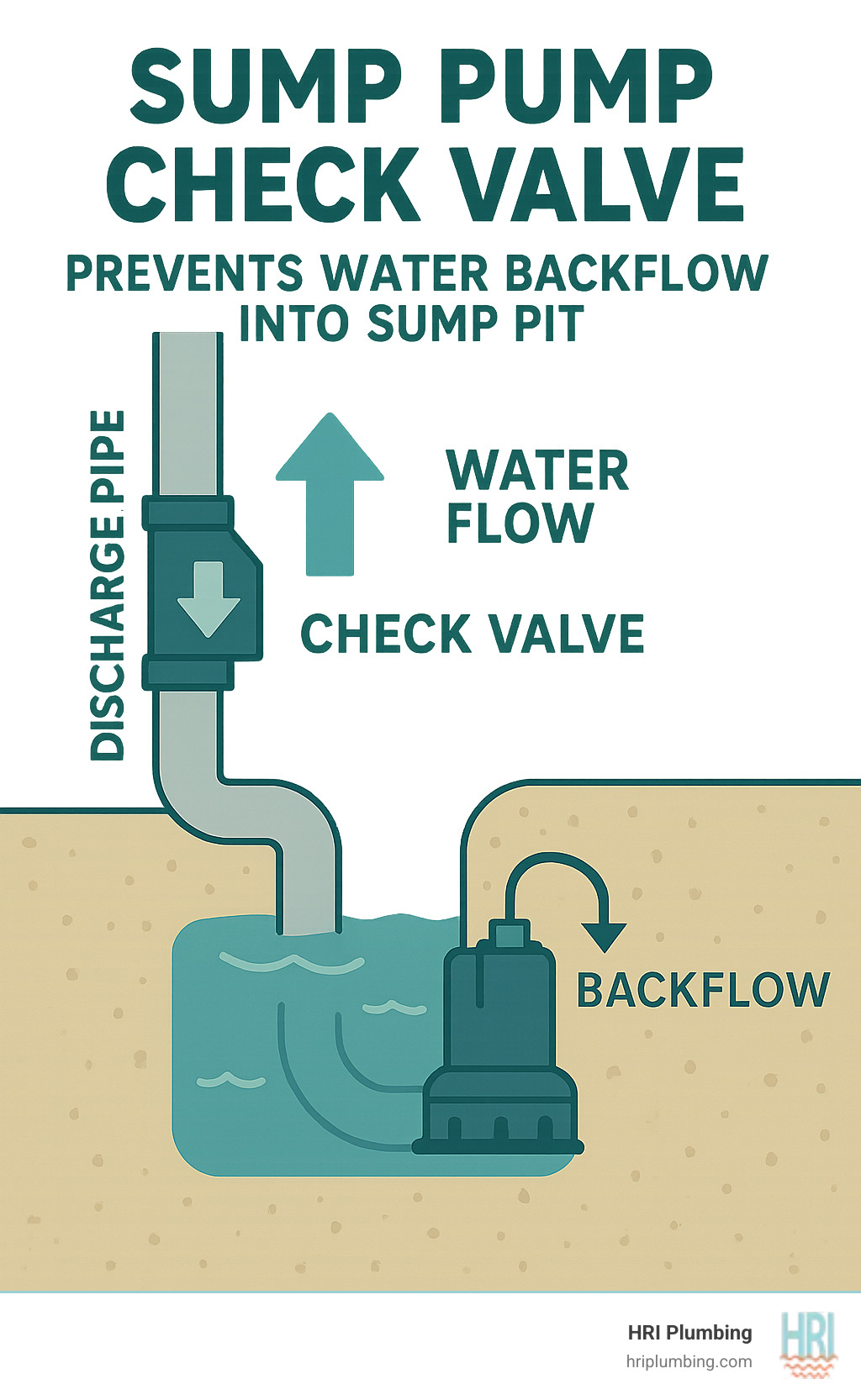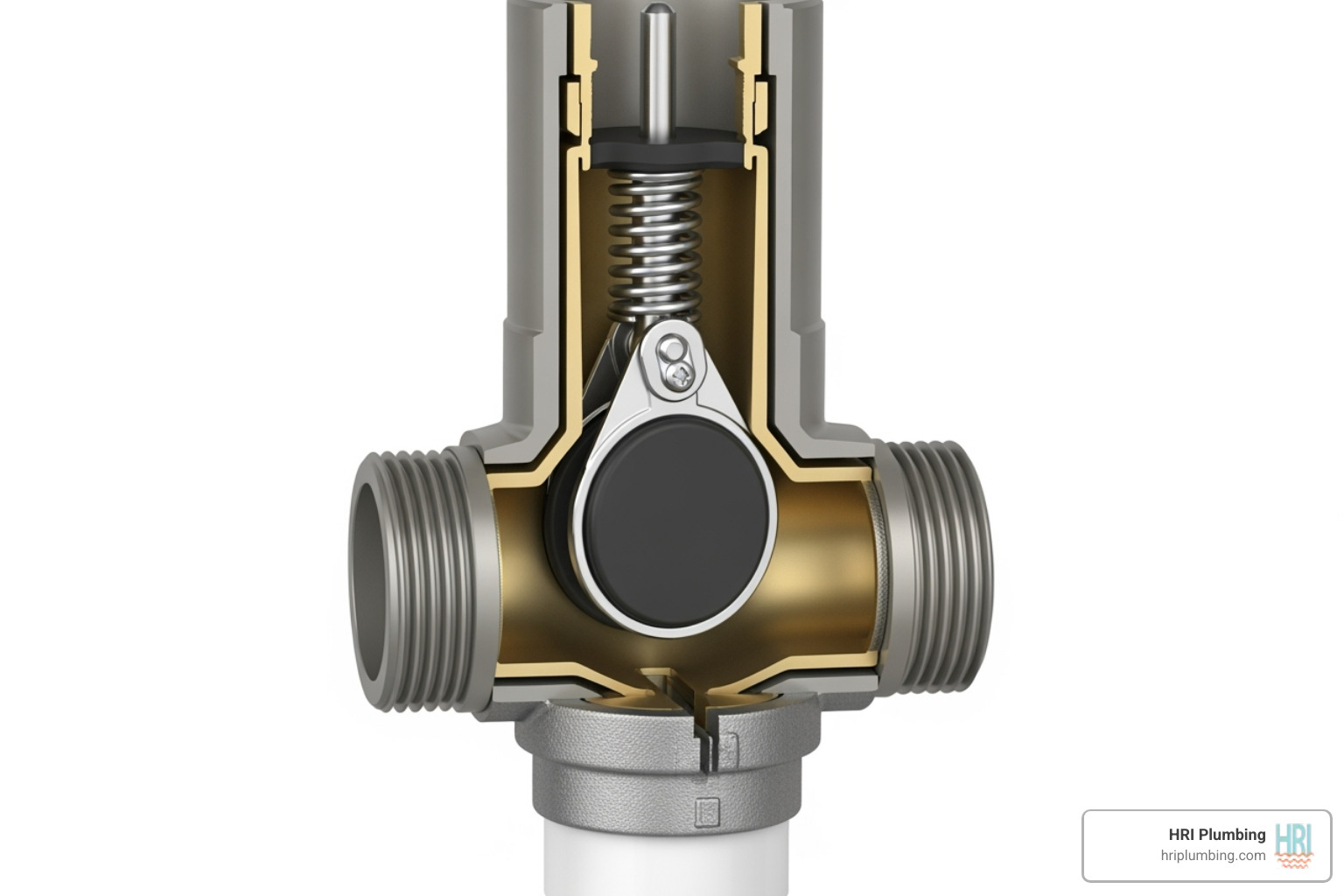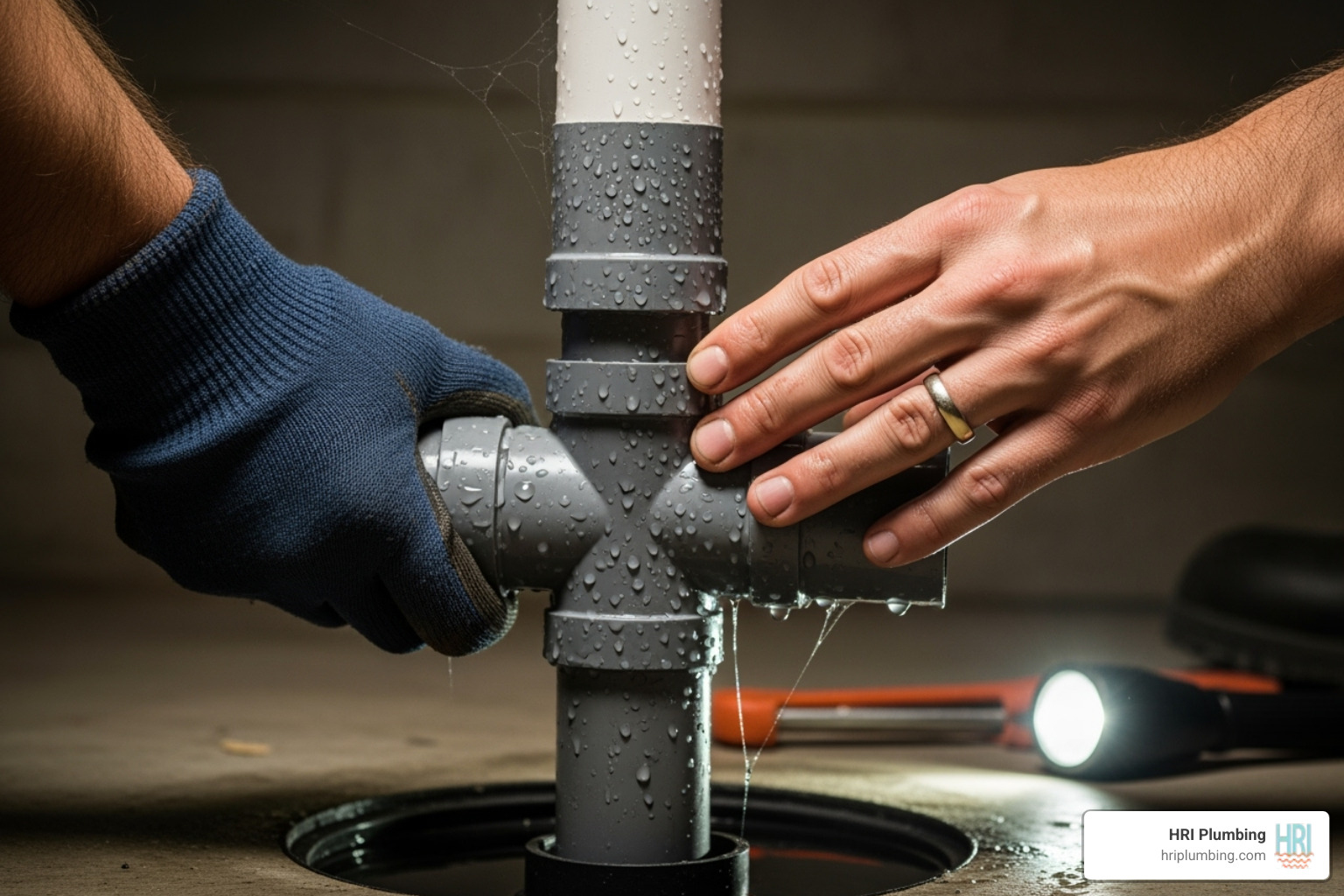Why Your Sump Pump Check Valve is Critical for Home Protection
A sump pump check valve is a one-way valve installed in your sump pump's discharge pipe that prevents water from flowing back into your basement after the pump shuts off. Here's what you need to know:
Key Functions:
- Prevents backflow - Stops discharged water from returning to the sump pit
- Protects pump motor - Eliminates strain from lifting the same water repeatedly
- Reduces short cycling - Prevents frequent on/off cycles that wear out your pump
- Saves electricity - Improves pumping efficiency by maintaining water flow direction
Common Types:
- Gravity-closing valves - Use a flapper that closes by gravity (may create noise)
- Spring-assisted valves - Close softly to eliminate "water hammer" sounds
- Ball check valves - Use a floating ball for secure sealing
Without this small but crucial component, your sump pump works much harder than it should. Water that was just pumped out flows right back down the discharge pipe into your pit. This creates a cycle where your pump constantly fights against itself - like trying to trying to fill a bucket with a hole in the bottom.
The result? Your pump runs more often, uses more electricity, and wears out faster. In smaller sump basins, backflow can even cause your basement to flood when the returning water overwhelms your pit's capacity.

The Core Component: Your Sump Pump Check Valve Explained
This small but mighty device is the key to an efficient and long-lasting sump pump system, acting as a one-way gate to keep water out of your home for good.
What is a Sump Pump Check Valve and Why is it Crucial?
Picture this: you've just spent all day cleaning your house, and right as you finish, someone opens the front door and lets all the dirt blow back in. Frustrating, right? That's exactly what happens to your sump pump without a sump pump check valve – it works hard to push water out, only to have it flow right back where it came from.

A sump pump check valve is essentially a one-way gate installed in your pump's discharge line. Think of it as a bouncer for your basement – water gets to leave through the door, but it's definitely not getting back in. This small device contains either a hinged flapper or a ball that opens when water flows out and snaps shut when the pump stops running.
Here's how it works in your system: When groundwater builds up in your sump pit, your pump kicks on and pushes that water up through the discharge pipe. The force of flowing water opens the valve's internal mechanism, allowing water to flow freely away from your home. The moment your pump finishes its job and shuts off, gravity (or a helpful spring) closes the valve tight, trapping all that water on the outside where it belongs.
Without this crucial component, you're asking for trouble. The water in your discharge pipe – which could be several feet of standing water – will simply drain right back into your pit. This means your pump has to move the same water over and over again, a problem called short cycling. It's like trying to fill a bucket with a huge hole in the bottom.
This constant re-pumping puts serious strain on your pump motor and dramatically shortens its lifespan. Your electricity bill takes a hit too, since your pump is working overtime for no good reason. In smaller sump pits, the returning water can even trigger your float switch immediately, causing your pump to run almost constantly. In extreme cases, this backflow can actually overwhelm your system and cause flooding, even with a "working" pump. That's why we always emphasize proper system setup – check out our guide on sump pump repair to prevent flooding for more protection tips.
The Unseen Benefits: Efficiency, Longevity, and Peace of Mind
The magic of a properly installed sump pump check valve goes way beyond just stopping backflow. It's like getting a tune-up for your car – suddenly everything runs smoother, lasts longer, and gives you confidence when you need it most.
The biggest game-changer is eliminating that frustrating short cycling we mentioned. When your pump doesn't have to re-pump the same water multiple times, it runs less frequently and works more efficiently. This translates directly to electricity savings – your pump uses energy to move water away from your home, not to play an endless game of water ping-pong.
But the real winner is your pump's longevity. Every time your pump cycles on and off, it creates wear and tear on the motor and internal components. By preventing unnecessary cycling, a check valve can literally add years to your pump's life. Less wear and tear means fewer repair calls and a system you can count on when the next big storm hits.
Here's a bonus you might not expect: noise reduction. If you've ever been startled by a loud "CLUNK" when your sump pump shuts off, you've experienced water hammer. This happens when the water column in your discharge pipe suddenly stops and crashes back down. Modern spring-assisted check valves eliminate this jarring noise by closing gently, giving you peace and quiet along with protection.
All of these benefits add up to something invaluable: peace of mind. When heavy rains hit or snow starts melting rapidly, you can rest easy knowing your system is working at peak efficiency. Your pump isn't fighting against itself, your basement stays dry, and your family stays safe. For more insights on how these systems protect your home year-round, read about how a sump pump helps to protect against groundwater flooding.
Choosing and Installing the Right Sump Pump Check Valve
Not all sump pump check valves are created equal, and choosing the right one can make the difference between a system that hums along quietly for years and one that drives you crazy with noise and problems. Let's break down what you need to know.
The most important factor is pipe size compatibility. Your check valve absolutely must match your discharge pipe diameter – common sizes include 1.25-inch, 1.5-inch, and 2-inch. Using the wrong size is like trying to put a square peg in a round hole, except with potential flooding consequences.
Material matters too. Most residential applications work perfectly with durable ABS plastic or PVC construction. These materials resist corrosion and handle groundwater like champs without breaking the bank. You'll find plenty of reliable durable plastic models that we recommend for most homes.
Now for the fun part – choosing your valve type. Gravity-closing valves use a simple flapper that drops shut when water stops flowing. They're cost-effective and reliable, but they can create that startling "water hammer" noise we talked about. Spring-assisted valves solve the noise problem by closing gently and work great in various orientations. Ball check valves use a floating ball for excellent sealing and tend to be very quiet, though they're sometimes bulkier.
Installation location is crucial for performance and maintenance. We typically install check valves about 8 to 12 inches above floor level, outside the sump pit where you can easily access them for inspection or replacement. This placement also reduces the water column weight your pump has to hold up.
Here's a technical detail that matters: if your system needs a weep hole to prevent airlock (a small hole that lets air escape), the check valve must be installed above that hole. This usually means placing it inside the sump basin, but it ensures your pump can operate properly and your float switch disengages correctly.
The bottom line? Every sump pump system benefits from a quality check valve, but smaller sump basins see the biggest improvement. When space is tight, even a small amount of backflow can trigger rapid cycling that wears out your pump fast. Getting the right valve properly installed from the start saves you money, frustration, and potential water damage down the road.
Keeping Your System Healthy: Maintenance and Troubleshooting
Regular checks and knowing the warning signs can prevent a small valve issue from turning into a major basement flood. Even the most reliable sump pump check valve needs a bit of attention from time to time – think of it as giving your basement's guardian angel a quick health check.
Recognizing Trouble: Signs of a Failing Check Valve
Your sump pump check valve is pretty good at its job, but like any hardworking component, it can show signs of wear over the years. The good news? These warning signs are usually pretty obvious once you know what to look for. Catching them early can save you from the headache (and expense) of dealing with a flooded basement.

The most telltale sign of trouble is constant cycling. If your sump pump seems to be having a conversation with itself – turning on and off every few minutes even when there's not much water coming in – your check valve probably isn't doing its job. This happens because water keeps flowing back into the pit after the pump shuts off, triggering it to start up again almost immediately. It's like trying to fill a bathtub with the drain open!
Loud clunking noises are another red flag. While some gravity-closing valves naturally make a soft "thunk" when they close, if you're hearing what sounds like someone dropping a bowling ball in your basement, that's not normal. This "water hammer" effect usually means the valve is slamming shut too hard or something's gone wrong with the mechanism.
Listen for gurgling sounds coming from your sump pit after the pump turns off. That's the sound of water draining back down where it shouldn't be going – essentially, your discharged water is taking a return trip to the basement. You might also notice that your pit refills quickly after the pump runs, even when no new groundwater is entering the system.
Visible leaks around the valve or its connections are pretty straightforward warning signs. Even small drips can indicate that seals are wearing out or connections are loosening. Sometimes debris or misalignment can prevent the valve from closing properly, though this is less common.
We recommend taking a peek at your system before and after heavy rain seasons. A few minutes of inspection can save you thousands in water damage repairs. If you're noticing any of these warning signs, don't wait – check out our guide on signs your sump pump needs professional repairs to learn more about what to watch for.
When to Call the Professionals for Repair or Replacement
Here's where we're going to be completely honest with you: while we love a good DIY project as much as anyone, sump pump check valve work isn't the best place to test your plumbing skills. The stakes are simply too high, and the consequences of getting it wrong can be pretty expensive.
DIY risks are real when it comes to this type of work. Install the valve backward, and you've essentially created a one-way ticket for water to flow back into your basement. Mess up the connections, and you could end up with leaks that cause significant water damage. Accidentally damage your pump during the process, and suddenly your simple valve replacement has turned into a much costlier pump replacement.
What makes professional service worth it is proper diagnosis. Sometimes what looks like a failing check valve might actually be a different issue entirely. Our experienced technicians can quickly identify whether your valve is the real culprit or if there's something else going on with your system. We know exactly which type and size of valve works best with your specific setup.
Professional installation means the job gets done right the first time. We'll make sure your new valve is properly sized, correctly oriented, and securely connected. More importantly, we'll perform system testing to confirm everything's working as it should before we pack up our tools.
At HRI Plumbing, we understand that your home's protection can't wait for regular business hours. That's why we offer 24/7 support throughout Jacksonville, Springfield, Rushville, Rochester, Chatham, and Sherman, IL. Our local teams know the unique challenges that Illinois weather can throw at your basement, and we're committed to providing honest, reliable service at affordable rates.
When your sump pump check valve starts showing signs of trouble, don't gamble with your basement's safety. Give us a call for professional sump pump repair in Rochester, IL, or any of our service areas. We'll get your system back to protecting your home the way it should – giving you the peace of mind that comes with knowing the job was done right.












